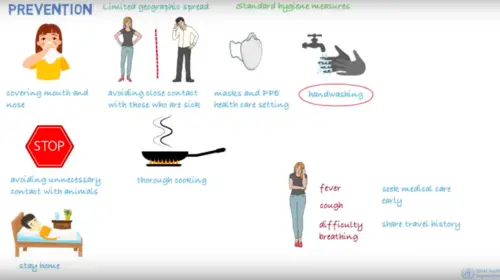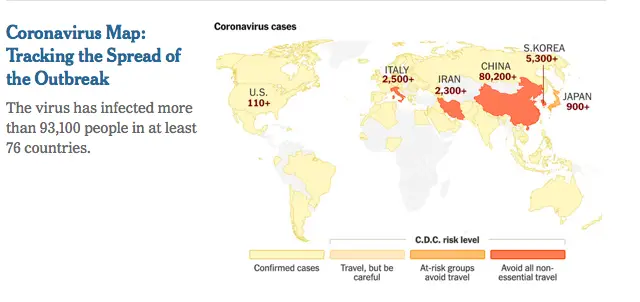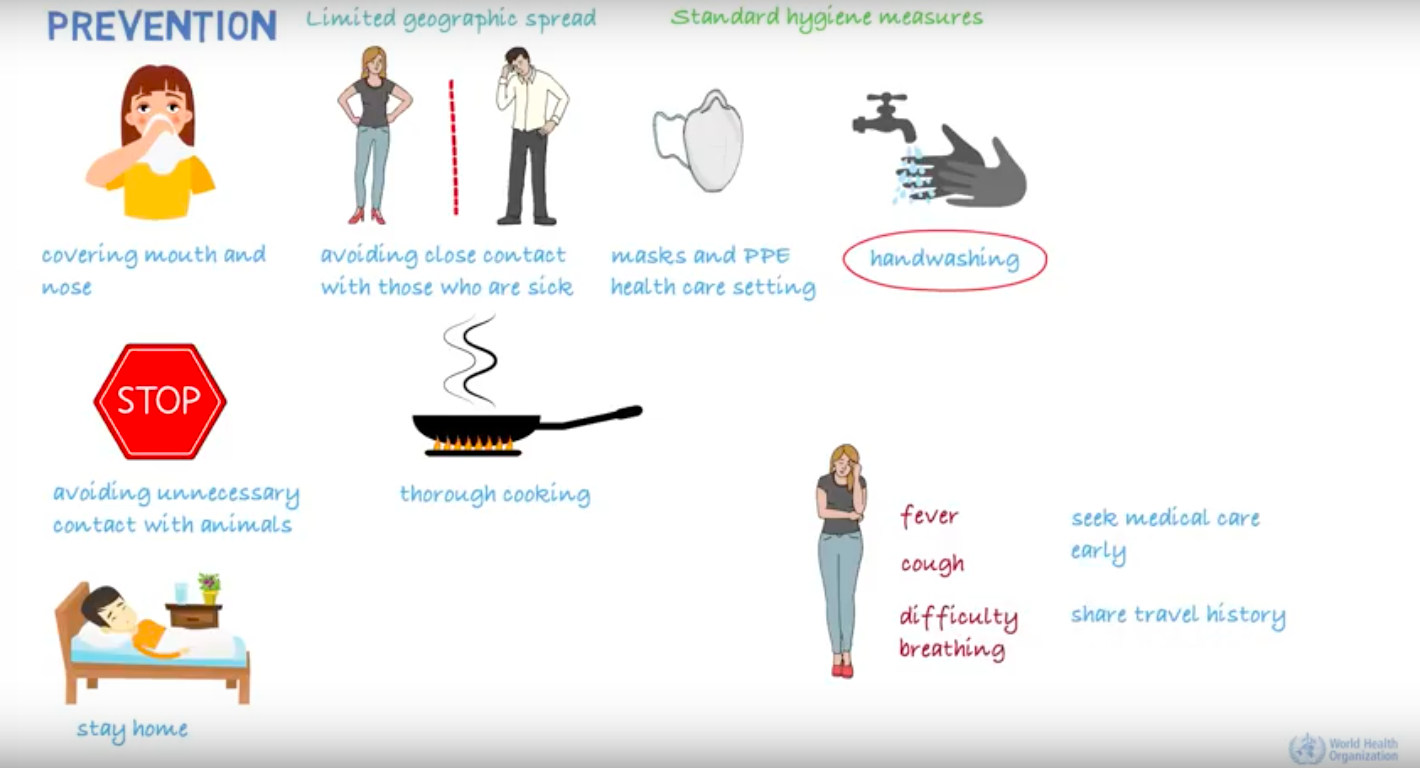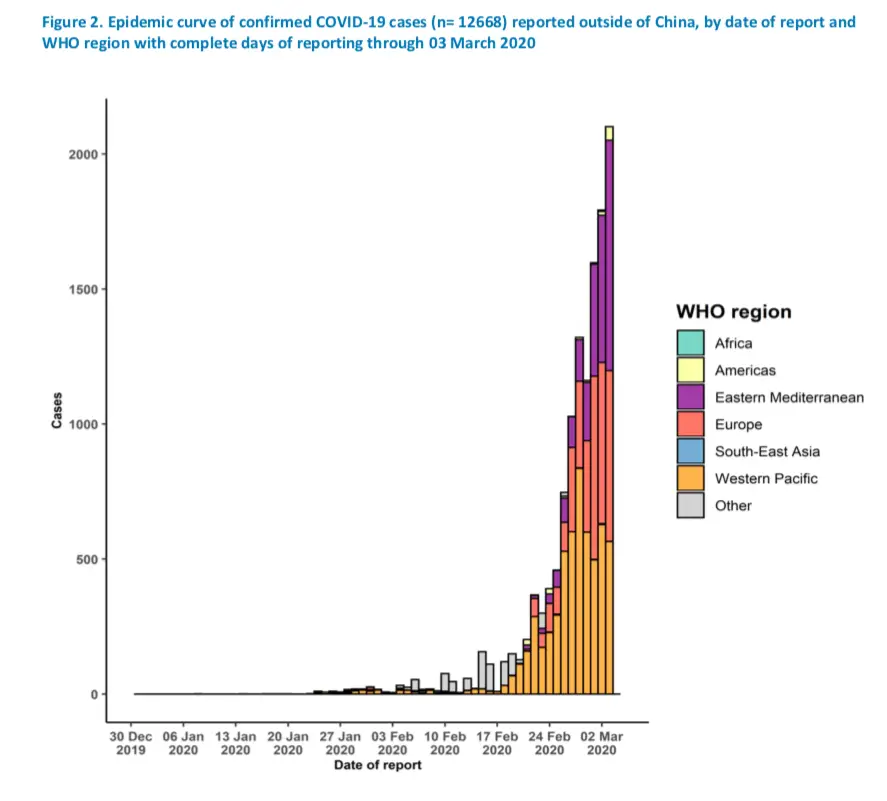What is Corona Virus (Covid- 19)?
Where do they come from?
How can you protect yourself?
Is there any treatment?
Myths Surrounding Coronavirus
Coronavirus in India: Live Updates
What is Corona Virus (Covid- 19)?
Coronaviruses are a family of viruses that range form common cold to MERS CoronaVirus (Middle East Respiratory Syndrome) and SARS Coronavirus (Severe Acute Respiratory Syndrome)
Where do they come from?
Coronaviruses are circulating in animals and some of these coronaviruses have the capability of transmitting between animals and humans which is called a spillover event.
How can you protect yourself from a CoronaVirus?
Corona viruses typically cause respiratory symptoms. So a basic hand hygiene is recommended such as washing hands with soap and water and also exercise respiratory hygiene such as, when you sneeze or cough, do it into your elbow. Avoid unnecessary contact with live animals and make sure that you wash your hands thoroughly after contact with animals and also make sure that your meat is cooked thoroughly before consuming.
Is there any treatment?
There are no treatments available currently but symptoms can be treated.
Coronavirus map:
Corona in India – Live Blog – Updates
-
Coronavirus News Live: Total 147 confirmed cases in India so far including 17 foreign nationals
LATEST: Two people have tested positive for COVID- 19 (coronavirus) in Noida.
A man who is a resident of sec 79 has tested positive on March 16th. He came in contact with his boss at his factory in sec 80 Noida after which he contracted the virus.
In another such instance – a lady who is a resident of sec 100 Noida has also tested positive for coronavirus. She has travel history to France. Both the patients are in isolation and are currently undergoing treatment,” said Chief Medical Officer (CMO) Dr Anurag Bhargava.”
The first case of the 2019–20 coronavirus pandemic was reported in India on 30 January 2020, originating from China. As of 16 March 2020, the Ministry of Health and Family Welfare has confirmed a total of 114 cases and 2 deaths in the country.
The outbreak has been declared an epidemic in Delhi, Haryana, Karnataka, Maharashtra and Uttar Pradesh, where provisions of the Epidemic Diseases Act, 1897 have been invoked, and educational institutions and many commercial establishments have been shut down. India has also suspended all tourist visas, as a majority of the confirmed cases were linked to other countries.
Paytm employee is 29th Coronavirus Patient In India – Report
A Paytm employee tested positive for coronavirus, the e-wallet company has since shut its Gurgaon office for two days. This is the 29th case that has tested positive in India. The figures shot up after a group of 15 tourists from Italy tested positive for the disease over the last 48 hours. An Indian driver, who was travelling along with those tourist, has also contracted the virus and tested positive.
The government on Wednesday said it has started screening passengers from all the incoming flights from abroad. Over 5 lakh people have already been screened.
The government on Tuesday, March 17th banned the entry of passengers from Afghanistan, Philippines and Malaysia to India with immediate effect, according to an additional travel advisory.
Here is more:
-
Paytm issued a statement which said the coronavirus-infected staffer has recently returned from Italy, top 3 nations that got affected badly and it is the worst-hit nation in Europe. Paytm advised its employees to work from home for the next two days, the statement said.
-
Fourteen of those 16 infected Italian tourists are being quarantined in Delhi. They were a part of a group of 23 Italians tourist, which came to Rajasthan last month. One of them – who is in Jaipur – tested positive on Tuesday; so has his wife. This is the largest group in the country to have been infected with coronavirus.
-
All passengers of the international flights will continue to undergo screening as per the measures taken by the government, Union Health Minister Harsh Vardhan had earlier briefed media – over 5,89,000 people have been screened at over 21 airports in the last two months, and over 10 lakh screened at borders with Nepal and around 27,000 are under surveillance, he added.
-
India has now beefed up preventative measures including barring visitors from countries like Italy, Iran, South Korea and Japan, except some diplomats and officials from international bodies. The Union Health Ministry has issued advisory not to travel to China, Iran, South Korea and Italy. It has also requested all citizens to avoid non-essential travel to those affected nations.
Prevention of Corona Virus:
- Cover your mouth and nose
- Avoid Close contact with those who show signs of sickness
- Use mask
- Clean you hands regularly with alcohol based sanitisers
- Avoid Unnecessary Contact with Animals
- Ensure Thougorugh cooking of food (Avoid Processed meat/raw meat)
- Stay Home
- Seek Medical assurance as early as possible in case of any health concerns no matter how small.
How should you protect yourself against Corona Virus (Covid – 19)
Watch this video:
Myth Buster: Coronavirus disease (COVID-19) advice for the public: Do’s and Dont’s/FAQs
Are hand dryers effective in killing the new coronavirus?
No. Hand dryers are not effective in killing the 2019-nCoV. To protect yourself against the new coronavirus, you should frequently clean your hands with an alcohol-based hand rub or wash them with soap and water. Once your hands are cleaned, you should dry them thoroughly by using paper towels or a warm air dryer.

Can an ultraviolet disinfection lamp kill the new coronavirus?
UV lamps should not be used to sterilize hands or other areas of skin as UV radiation can cause skin irritation.

How effective are thermal scanners in detecting people infected with the new coronavirus?
Thermal scanners are effective in detecting people who have developed a fever (i.e. have a higher than normal body temperature) because of infection with the new coronavirus.
However, they cannot detect people who are infected but are not yet sick with fever. This is because it takes between 2 and 10 days before people who are infected become sick and develop a fever.

Can spraying alcohol or chlorine all over your body kill the new coronavirus?
No. Spraying alcohol or chlorine all over your body will not kill viruses that have already entered your body. Spraying such substances can be harmful to clothes or mucous membranes (i.e. eyes, mouth). Be aware that both alcohol and chlorine can be useful to disinfect surfaces, but they need to be used under appropriate recommendations.

Is it safe to receive a letter or a package from China?
Yes, it is safe. People receiving packages from China are not at risk of contracting the new coronavirus. From previous analysis, we know coronaviruses do not survive long on objects, such as letters or packages.

Can pets at home spread the new coronavirus (2019-nCoV)?
At present, there is no evidence that companion animals/pets such as dogs or cats can be infected with the new coronavirus. However, it is always a good idea to wash your hands with soap and water after contact with pets. This protects you against various common bacteria such as E.coli and Salmonella that can pass between pets and humans.

Do vaccines against pneumonia protect you against the new coronavirus?
No. Vaccines against pneumonia, such as pneumococcal vaccine and Haemophilus influenza type B (Hib) vaccine, do not provide protection against the new coronavirus.
The virus is so new and different that it needs its own vaccine. Researchers are trying to develop a vaccine against 2019-nCoV, and WHO is supporting their efforts.
Although these vaccines are not effective against 2019-nCoV, vaccination against respiratory illnesses is highly recommended to protect your health.

Can regularly rinsing your nose with saline help prevent infection with the new coronavirus?
No. There is no evidence that regularly rinsing the nose with saline has protected people from infection with the new coronavirus.
There is some limited evidence that regularly rinsing nose with saline can help people recover more quickly from the common cold. However, regularly rinsing the nose has not been shown to prevent respiratory infections.

Can eating garlic help prevent infection with the new coronavirus?
Garlic is a healthy food that may have some antimicrobial properties. However, there is no evidence from the current outbreak that eating garlic has protected people from the new coronavirus.

Does putting on sesame oil block the new coronavirus from entering the body?
No. Sesame oil does not kill the new coronavirus. There are some chemical disinfectants that can kill the 2019-nCoV on surfaces. These include bleach/chlorine-based disinfectants, either solvents, 75% ethanol, peracetic acid and chloroform.
However, they have little or no impact on the virus if you put them on the skin or under your nose. It can even be dangerous to put these chemicals on your skin.

Does the new coronavirus affect older people, or are younger people also susceptible?
People of all ages can be infected by the new coronavirus (2019-nCoV). Older people, and people with pre-existing medical conditions (such as asthma, diabetes, heart disease) appear to be more vulnerable to becoming severely ill with the virus.
WHO advises people of all ages to take steps to protect themselves from the virus, for example by following good hand hygiene and good respiratory hygiene.

Are antibiotics effective in preventing and treating the new coronavirus?
No, antibiotics do not work against viruses, only bacteria.
The new coronavirus (2019-nCoV) is a virus and, therefore, antibiotics should not be used as a means of prevention or treatment.
However, if you are hospitalized for the 2019-nCoV, you may receive antibiotics because bacterial co-infection is possible.

Are there any specific medicines to prevent or treat the new coronavirus?
To date, there is no specific medicine recommended to prevent or treat the new coronavirus (2019-nCoV).
However, those infected with the virus should receive appropriate care to relieve and treat symptoms, and those with severe illness should receive optimized supportive care. Some specific treatments are under investigation, and will be tested through clinical trials. WHO is helping to accelerate research and development efforts with a range or partners.
How to wear/use a mask? How effective is it?
- If you are healthy, you only need to wear a mask if you are taking care of a person with suspected 2019-nCoV infection.
- Wear a mask if you are coughing or sneezing.
- Masks are effective only when used in combination with frequent hand-cleaning with alcohol-based hand rub or soap and water.
- If you wear a mask, then you must know how to use it and dispose of it properly. Watch the video below for more on this topic.
How to put on, use, take off and dispose of a mask
- Before putting on a mask, clean hands with alcohol-based hand rub or soap and water.
- Cover mouth and nose with mask and make sure there are no gaps between your face and the mask.
- Avoid touching the mask while using it; if you do, clean your hands with alcohol-based hand rub or soap and water.
- Replace the mask with a new one as soon as it is damp and do not re-use single-use masks.
- To remove the mask: remove it from behind (do not touch the front of mask); discard immediately in a closed bin; clean hands with alcohol-based hand rub or soap and water.







What Is a Pandemic?
A pandemic is a term to describe a disease which has spread across many countries/continents and affects a huge number of people. Neither the CDC nor the WHO has specified how many countries or people need to be affected in order for something to be declared as a pandemic.
It is assumed that with a pandemic everyone can be potentially exposed
Doctors/experts suggest – before a disease becomes a pandemic, it has to reach a few other levels.
Some previous examples of pandemics include:
- The Spanish flu (H1N1 virus) of 1918. About 500 million people – a third of the population around the globe – were sick from the Spanish flu. Did you know? Roughly 50 million people or more died from it around the world, according to the CDC.
- In 1968, there was a pandemic caused by an influenza A (H3N2) virus that killed close to a million people worldwide, including 100,000 in the U.S.
Is the New Coronavirus an Epidemic or Pandemic?
COVID-19 is now officially a pandemic, as WHO director-general Tedros Adhanom Ghebreyesus declared during a media briefing on Wednesday, March 11.
Let’s spread some awareness around Covid – 19. Please help us share it with as many people as possible Thank You!





